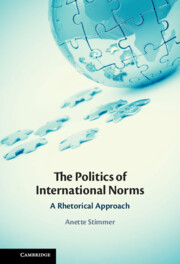Book contents
- The Politics of International Norms
- The Politics of International Norms
- Copyright page
- Dedication
- Contents
- Figures
- Tables
- Acknowledgments
- Abbreviations
- Introduction
- 1 Alternate Endings of Norm Contestation
- 2 Persistence of Alternate Endings
- 3 Norm Impasse
- 4 Norm Neglect
- 5 Norm Recognition
- 6 Norm Clarification
- Conclusion
- Bibliography
- Index
2 - Persistence of Alternate Endings
Argumentation, Audience Reactions, and Speakers (Delegation to Agents)
Published online by Cambridge University Press: 07 February 2025
- The Politics of International Norms
- The Politics of International Norms
- Copyright page
- Dedication
- Contents
- Figures
- Tables
- Acknowledgments
- Abbreviations
- Introduction
- 1 Alternate Endings of Norm Contestation
- 2 Persistence of Alternate Endings
- 3 Norm Impasse
- 4 Norm Neglect
- 5 Norm Recognition
- 6 Norm Clarification
- Conclusion
- Bibliography
- Index
Summary
This chapter identifies factors that are extrinsic to norms and affect the stability of the alternate endings. Three classical elements of rhetoric guide the analysis: speakers, audiences, and arguments. The chapter first discusses my focus on critical states with decision-making authority. Speakers need the support of important audiences to avoid or reduce social and material costs of proposing "inappropriate" norm interpretations. Some audiences are more important than others: Speakers are likely to prioritize gaining approval for their norm interpretations from their in-groups and domestic audiences. The chapter gives guidance on identifying in-groups. Speakers try to gain support for their norm interpretations through their argumentation: We would expect the use of legal language and output legitimation when norm interpretations are openly proposed, and identity-based legitimation when actors try to hide exceptionalist norm interpretations. Lastly, I draw attention to a particular kind of speaker – agents to whom norm interpretation was delegated. When agents are involved, perceptions of agent competence also affect what interpretations can be upheld. The chapter concludes that audience reactions, argumentation, and delegation to agents affect the extent of collective expectations surrounding norm application, and thus norm strength.
Keywords
- Type
- Chapter
- Information
- The Politics of International Norms , pp. 78 - 117Publisher: Cambridge University PressPrint publication year: 2025

